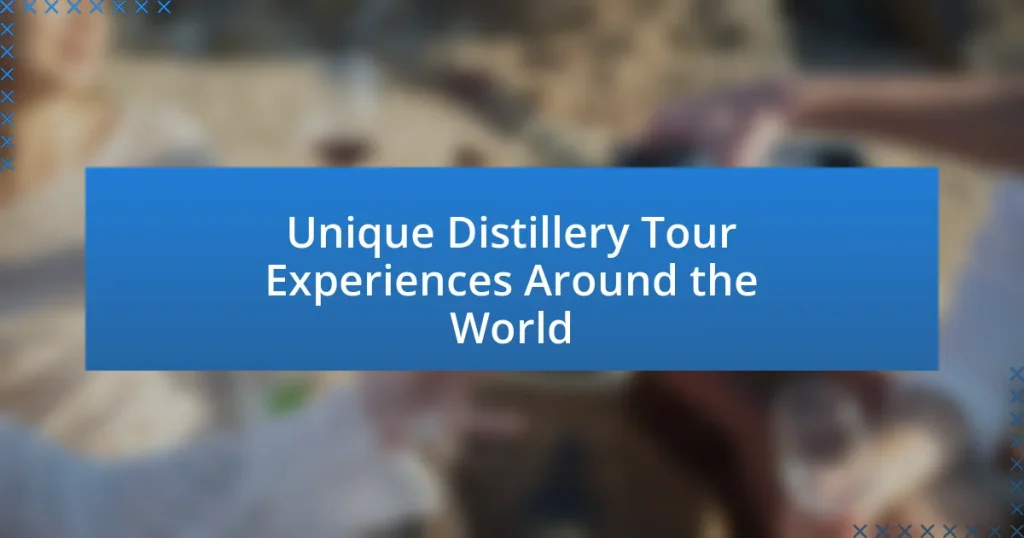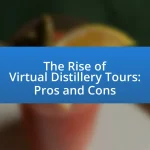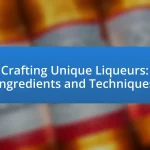Unique distillery tour experiences around the world offer immersive tastings, interactive workshops, and exclusive behind-the-scenes access, enhancing visitor engagement and appreciation for the craft of distillation. These tours differ from traditional visits by incorporating hands-on activities, such as blending workshops and sensory tastings, allowing participants to create personalized spirits. Cultural influences shape the storytelling and practices showcased during these tours, while the rising popularity of craft beverages and experiential travel drives consumer interest. Notable distillery tours include those in Scotland, Japan, and Kentucky, each providing unique insights into local production methods and ingredients. Travelers can also explore lesser-known distilleries that emphasize artisanal techniques and regional flavors, enriching their understanding of the distillation process.

What are Unique Distillery Tour Experiences Around the World?
Unique distillery tour experiences around the world include immersive tastings, interactive workshops, and exclusive behind-the-scenes access. For instance, the Glenfiddich Distillery in Scotland offers a unique “Connoisseur Tour,” which includes a private tasting of rare whiskies and a guided exploration of the distillation process. In Japan, the Nikka Whisky Sendai Distillery provides visitors with the opportunity to blend their own whisky, creating a personalized experience. Additionally, the Jack Daniel’s Distillery in Tennessee features a “Distillery Tour” that includes a visit to the cave spring that provides the water for their whiskey, showcasing the importance of local resources. These experiences not only highlight the craftsmanship involved in distilling but also engage visitors in a way that enhances their appreciation for the spirits produced.
How do these tours differ from traditional distillery visits?
Unique distillery tours differ from traditional distillery visits by offering immersive, hands-on experiences that engage participants in the production process. While traditional visits typically focus on guided tours of the facility and tastings, unique tours may include activities such as blending workshops, sensory tastings, and interactions with master distillers. For example, some tours allow guests to create their own custom spirits, providing a personalized experience that traditional visits do not offer. This shift towards experiential learning enhances visitor engagement and deepens their understanding of the distillation process.
What unique elements are commonly found in these tours?
Unique elements commonly found in distillery tours include interactive tastings, behind-the-scenes access to production processes, and opportunities to meet master distillers. These tours often feature guided tastings that allow participants to sample various spirits directly from the source, enhancing the sensory experience. Additionally, many tours provide exclusive insights into the distillation process, showcasing unique techniques and equipment used in production. Meeting master distillers offers guests a chance to learn about the craft and artistry behind the spirits, adding a personal touch to the experience.
How do cultural influences shape the distillery tour experience?
Cultural influences significantly shape the distillery tour experience by dictating the storytelling, traditions, and practices showcased during the tour. For instance, in Scotland, distillery tours often emphasize the historical significance of whisky production, highlighting local legends and traditional methods that have been passed down through generations. This cultural narrative enhances visitor engagement and appreciation for the craft. Additionally, in Japan, distillery tours may incorporate elements of Zen philosophy, focusing on harmony and precision in the whisky-making process, which reflects the broader cultural values of the region. Such cultural contexts not only enrich the educational aspect of the tours but also create a unique atmosphere that resonates with visitors, making the experience memorable and culturally immersive.
Why are unique distillery tours gaining popularity?
Unique distillery tours are gaining popularity due to the increasing consumer interest in craft beverages and experiential travel. This trend is driven by a desire for authentic experiences, where visitors can engage directly with the production process and learn about the history and craftsmanship behind their favorite spirits. According to a report by the Distilled Spirits Council, craft distilleries have seen a significant rise in the number of visitors, with many reporting a 20% increase in tour attendance over the past few years. This growth reflects a broader shift towards personalized and immersive experiences in the tourism sector, appealing to consumers who value quality and storytelling in their beverage choices.
What factors contribute to the rise in interest for these experiences?
The rise in interest for unique distillery tour experiences is primarily driven by the growing consumer demand for authentic and immersive experiences. This trend is supported by a shift in consumer preferences towards experiential travel, where individuals seek deeper connections with local culture and craftsmanship. According to a 2022 report by the Adventure Travel Trade Association, 65% of travelers prioritize experiences over material goods, indicating a significant market shift. Additionally, the increasing popularity of craft spirits and local distilleries, which have seen a 20% growth in the U.S. alone from 2015 to 2020, further fuels interest in distillery tours as consumers desire to learn about production processes and taste unique offerings directly from the source.
How do social media and travel trends impact distillery tours?
Social media and travel trends significantly enhance the visibility and appeal of distillery tours. The rise of platforms like Instagram and TikTok allows distilleries to showcase their unique offerings, attracting a broader audience through visually engaging content. For instance, posts featuring picturesque distillery settings or innovative tasting experiences can go viral, leading to increased visitor numbers. Additionally, travel trends such as experiential tourism emphasize authentic local experiences, prompting travelers to seek out distillery tours as part of their itineraries. According to a 2022 report by the Distilled Spirits Council, distillery visits have increased by 20% over the past five years, largely driven by social media marketing and the growing interest in craft beverages.
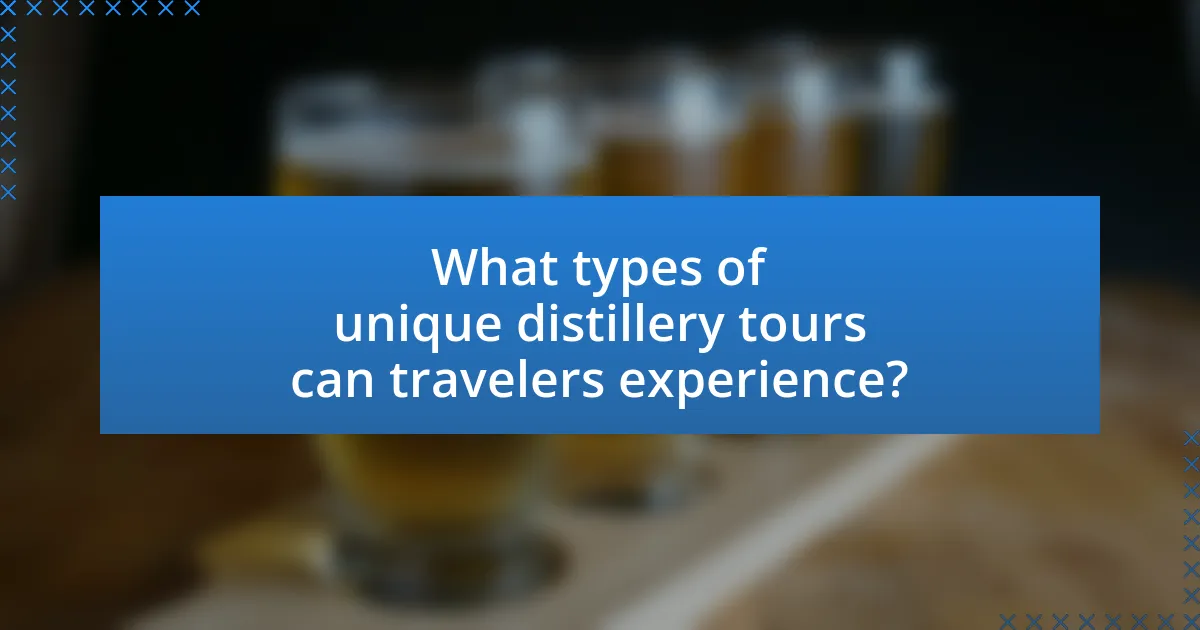
What types of unique distillery tours can travelers experience?
Travelers can experience a variety of unique distillery tours, including craft distillery tours, whiskey tastings, gin-making workshops, and rum distillation experiences. Craft distillery tours often focus on small-batch production methods, allowing visitors to engage with the distillers and learn about the artisanal processes involved. Whiskey tastings typically include guided sampling of different whiskey varieties, often paired with food. Gin-making workshops provide hands-on opportunities for participants to create their own gin blends, while rum distillation experiences may involve tours of sugarcane fields and insights into the fermentation process. These tours not only educate travelers about the distillation process but also offer immersive experiences that highlight local ingredients and traditions.
What are some examples of themed distillery tours?
Examples of themed distillery tours include whiskey tasting tours in Scotland, where visitors explore the history and production of Scotch whisky, and rum distillery tours in the Caribbean, which often highlight the cultural significance of rum in local traditions. Additionally, gin distillery tours in London frequently focus on the botanical ingredients used in gin production, while craft beer brewery tours in the United States may emphasize the brewing process and local ingredients. These tours provide immersive experiences that educate participants about the unique aspects of each spirit and its regional heritage.
How do craft distilleries offer unique experiences?
Craft distilleries offer unique experiences by providing personalized tours that emphasize small-batch production and local ingredients. These distilleries often engage visitors through interactive tastings, where guests can sample a variety of spirits and learn about the distillation process directly from the makers. For instance, many craft distilleries incorporate storytelling about their heritage and the specific techniques they use, which enhances the visitor’s connection to the product. Additionally, craft distilleries frequently host events such as cocktail classes or seasonal festivals, creating immersive experiences that reflect the local culture and community. This hands-on approach not only educates visitors but also fosters a deeper appreciation for artisanal spirits.
What role do local ingredients play in these tours?
Local ingredients are essential in these tours as they enhance the authenticity and flavor profile of the beverages produced. By utilizing ingredients sourced from the surrounding region, distilleries create unique products that reflect the local terroir, which can significantly influence taste and quality. For instance, a distillery in Scotland may use locally grown barley and pure spring water, resulting in a whisky that embodies the characteristics of its environment. This practice not only supports local agriculture but also provides visitors with a deeper understanding of the cultural and historical context of the beverages they are tasting.
How do immersive experiences enhance distillery tours?
Immersive experiences enhance distillery tours by engaging visitors through interactive elements that deepen their understanding of the distillation process and the brand’s heritage. These experiences often include sensory activities such as tastings, guided workshops, and virtual reality simulations that allow participants to explore the distillation environment and techniques firsthand. For instance, a study by the Distilled Spirits Council found that 75% of visitors to distilleries reported a greater appreciation for the craft after participating in hands-on activities. This engagement not only enriches the visitor experience but also fosters a stronger emotional connection to the brand, ultimately leading to increased customer loyalty and sales.
What interactive elements are commonly included in these tours?
Interactive elements commonly included in distillery tours are tastings, guided sensory experiences, and hands-on workshops. Tastings allow participants to sample various spirits, enhancing their understanding of flavor profiles and production methods. Guided sensory experiences often involve smelling and identifying different ingredients used in the distillation process, which deepens appreciation for the craft. Hands-on workshops may include activities like blending spirits or creating custom cocktails, providing a practical understanding of distillation techniques. These elements engage visitors actively, making the tours more memorable and educational.
How do sensory experiences contribute to the overall enjoyment?
Sensory experiences significantly enhance overall enjoyment by engaging multiple senses, which creates a richer and more immersive experience. For instance, during a distillery tour, the aroma of aging spirits, the visual appeal of the distillation process, and the taste of samples all contribute to a heightened appreciation of the craft. Research indicates that multisensory engagement can increase emotional responses and satisfaction levels; a study published in the Journal of Consumer Research found that experiences involving multiple senses lead to stronger memories and enjoyment. Thus, sensory experiences are crucial in transforming a simple tour into a memorable and enjoyable event.
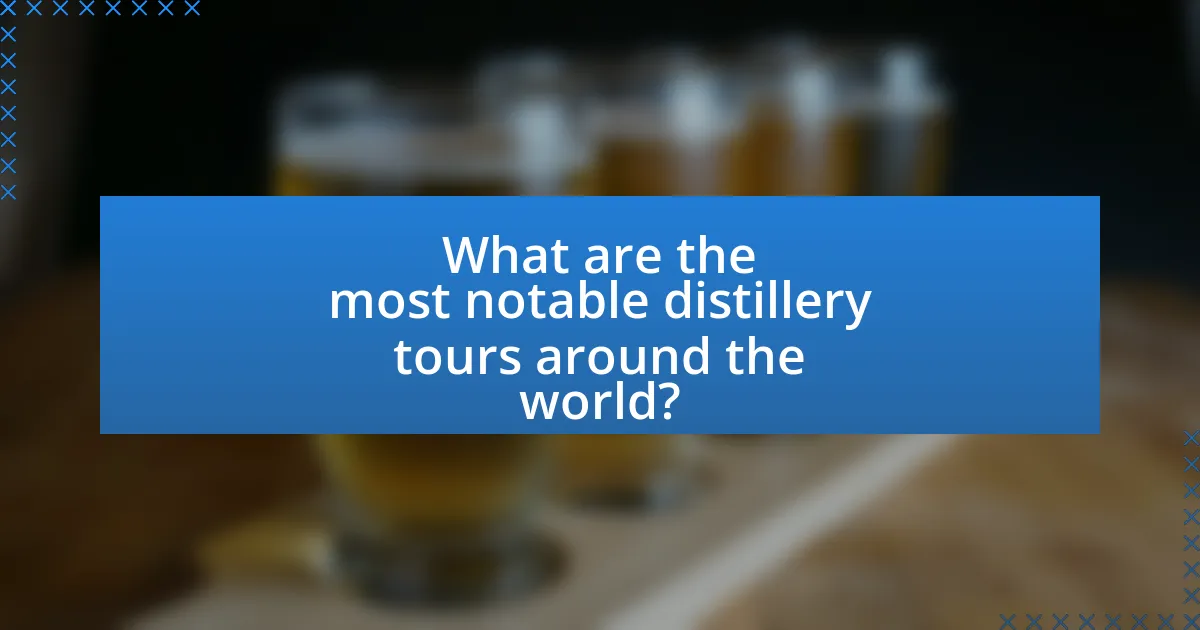
What are the most notable distillery tours around the world?
The most notable distillery tours around the world include the Jameson Distillery in Ireland, the Glenfiddich Distillery in Scotland, and the Maker’s Mark Distillery in the United States. The Jameson Distillery, located in Midleton, offers a comprehensive tour that showcases the whiskey-making process and includes tastings of their signature products. Glenfiddich, one of the most awarded distilleries, provides an immersive experience with guided tours through their historic facilities and tastings of their renowned single malts. Maker’s Mark, known for its bourbon, features a unique tour that allows visitors to see the production process and even dip their own bottles in wax. These tours are recognized for their educational value and the opportunity to sample high-quality spirits directly from the source.
Which regions are known for their unique distillery experiences?
Regions known for their unique distillery experiences include Scotland, Kentucky, and Japan. Scotland is renowned for its whisky distilleries, particularly in regions like Islay and Speyside, where visitors can explore traditional methods and taste a variety of single malts. Kentucky is famous for its bourbon distilleries, with the Kentucky Bourbon Trail offering tours that highlight the state’s rich bourbon-making heritage. Japan has gained international acclaim for its whisky, with distilleries such as Yamazaki and Nikka providing immersive experiences that showcase their craftsmanship and unique flavor profiles.
What makes the Scottish whisky tours stand out?
Scottish whisky tours stand out due to their rich heritage, unique production methods, and the opportunity to explore diverse distilleries across scenic landscapes. The tours often include tastings of single malts, which are crafted using traditional techniques that date back centuries, such as copper pot still distillation and natural fermentation. Additionally, Scotland is home to over 130 distilleries, each offering distinct flavors influenced by local ingredients and regional climates, making the experience both educational and immersive. The combination of historical significance, craftsmanship, and breathtaking surroundings contributes to the uniqueness of Scottish whisky tours.
How do Japanese distilleries create a unique visitor experience?
Japanese distilleries create a unique visitor experience through immersive tours that highlight their craftsmanship and cultural heritage. Visitors engage in guided tastings, where they learn about the meticulous production processes, including the use of local ingredients and traditional techniques. For instance, the Yamazaki Distillery offers a comprehensive tour that includes a museum showcasing the history of Japanese whisky, as well as a tasting room with panoramic views of the surrounding landscape. Additionally, many distilleries incorporate elements of Japanese hospitality, or “omotenashi,” ensuring personalized service that enhances the overall experience. This combination of education, scenic beauty, and exceptional service distinguishes Japanese distilleries in the global market.
What are some lesser-known distillery tours worth exploring?
Some lesser-known distillery tours worth exploring include the Balcones Distilling in Texas, which offers a unique insight into American single malt whiskey production, and the Westland Distillery in Seattle, known for its innovative approach to whiskey-making using local ingredients. Additionally, the St. George Spirits in California provides a fascinating tour of craft distilling techniques, focusing on a variety of spirits including gin and absinthe. These distilleries are recognized for their artisanal methods and commitment to quality, making them standout options for enthusiasts seeking unique experiences.
How do these tours provide a different perspective on distillation?
These tours provide a different perspective on distillation by offering immersive experiences that highlight the craftsmanship and science behind the process. Participants engage directly with distillers, gaining insights into the unique ingredients, techniques, and regional influences that shape each spirit. For example, tours often include tastings that emphasize the flavor profiles resulting from specific distillation methods, such as pot still versus column still. This hands-on approach allows visitors to appreciate the nuances of distillation, transforming it from a mere industrial process into an art form that reflects cultural heritage and innovation.
What hidden gems should travelers consider visiting?
Travelers should consider visiting the distilleries in the Scottish Highlands, specifically the Edradour Distillery, known for being one of the smallest distilleries in Scotland. Edradour produces high-quality single malt whisky using traditional methods, which offers a unique experience compared to larger distilleries. Additionally, the distillery is set in a picturesque location, enhancing the overall visit. The distillery’s production process, which includes hand-crafted techniques and a focus on small-batch production, provides insight into the art of whisky making, making it a hidden gem for enthusiasts.
What practical tips can enhance your distillery tour experience?
To enhance your distillery tour experience, arrive early to allow time for check-in and to explore the distillery’s surroundings. This preparation helps you engage more fully with the tour. Additionally, ask questions during the tour to gain deeper insights into the distillation process and the history of the distillery, as knowledgeable guides often appreciate inquisitive guests. Participating in tastings at the end of the tour can also enrich your experience, allowing you to sample various products and understand flavor profiles. Lastly, consider taking notes during the tour; this practice can help you remember details and enhance your appreciation of the spirits you taste.
How can you prepare for a unique distillery tour?
To prepare for a unique distillery tour, research the specific distillery’s offerings and schedule in advance. Understanding the distillery’s production methods, history, and types of spirits produced enhances the experience. Additionally, consider booking a guided tour, as these often provide in-depth insights and tastings. Many distilleries also offer special events or seasonal tours that require advance reservations, so checking their website or contacting them directly is advisable. Engaging with online reviews or forums can provide personal insights from previous visitors, further enriching your preparation.
What should you look for when choosing a distillery tour to attend?
When choosing a distillery tour to attend, prioritize the quality of the experience offered. Look for tours that provide in-depth insights into the distillation process, including the ingredients used and the techniques employed. A reputable distillery often features knowledgeable guides who can share historical context and production details, enhancing the educational aspect of the tour. Additionally, consider the distillery’s awards or recognitions, as these can indicate the quality of their products and the expertise behind them. For example, distilleries that have won international spirits competitions often provide a more refined experience.
